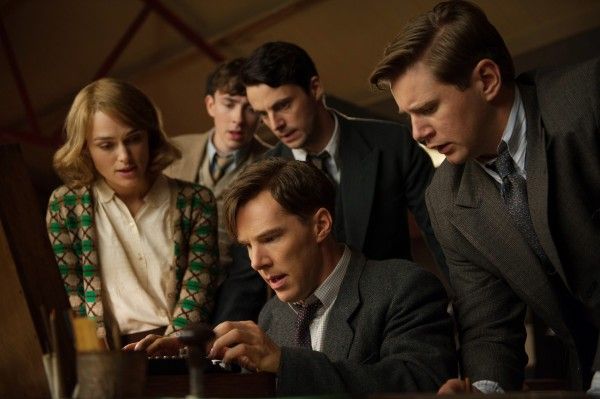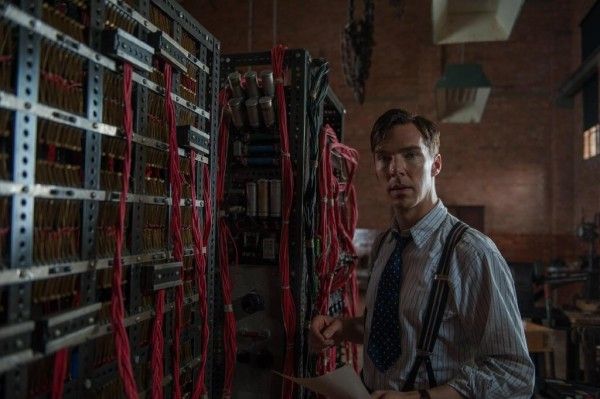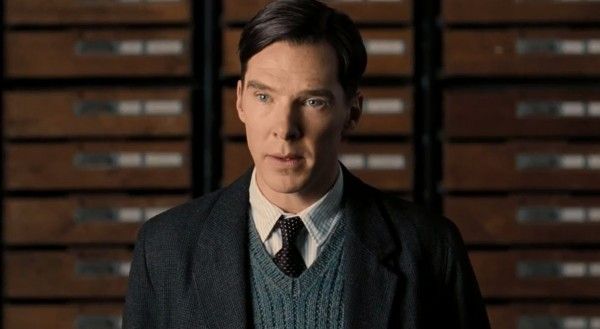In September 1933, General George S. Patton told the Calvary Journal, “Wars may be fought with weapons, but they are won by men.” Mathematician Alan Turning proved Patton’s statement was only half true when it came to World War II. It was won by men and a machine. Turing and his team used a computer to decipher the Germans’ “Enigma” code, which turned the tide of the war and was one of the key contributions to the Allies’ victory. Morten Tyldum’s The Imitation Game is a compelling look at a man treated inhumanely and the creation of his machine that helped saved humanity from evil. The film isn’t hard to crack, but led by Benedict Cumberbatch’s outstanding performance and Tyldum’s strong direction, it’s a compelling tale of secrets, lies, and sacrifice.
In 1951, there’s been a break-in at Alan Turing’s (Cumberbatch) home, but nothing has been stolen, so Inspector Nock (Rory Kinnear) starts digging to find out why. We then cut back to 1939 and learn about Turing joining the military so he can solve the toughest puzzle in the world, Enigma, which encrypts Germany’s communications. Brilliant but arrogant, Turing believes the only way to break the code is to build a machine, and he reluctantly works with cryptologists Hugh Alexander (Matthew Goode), John Cairncross (Allen Leech), and Peter Hilton (Matthew Beard) to accomplish their mission. However, Turing does take a liking to Joan Clarke (Keira Knightley), a brilliant woman who’s underestimated by others because of her gender. In between the plotlines in 1951 and 1939, we also occasionally turn back to 1928 where we see a teenage Turing fall for one of his male classmates.
One of the best aspects of The Imitation Game is how it makes Turing’s homosexuality a key part of his story, but not the only part of his identity. He had to remain closeted in order to continue his work, but we’re not constantly being reminded of his sexuality as if it were an obstacle. He is not solely defined by his sexual orientation. It is part of a fully formed character who has other interests, goals, traits, and quite a few shortcomings when it comes to social interactions.
Early in the film, it feels like we’re about to get a variation of Cumberbatch’s Sherlock Holmes. But Cumberbatch’s Alan Turing is Holmes if he were a real person instead of someone who, for all intents and purposes, is a superhero. Holmes is a very entertaining character, but for Turing, there has to be a serious, emotional underpinning. The reason he rejects others needs to be more interesting than simply being the smartest person in the room. He must develop real relationships, not just for historical accuracy, but because it would be somewhat uninteresting if he built the machine singlehandedly. And that’s not to mention paying honor to the memory of Turing by remembering that if you want to show someone as a great person, you must first depict him or her as a real person.
Watching Cumberbatch’s career explode over the past several years, I’ve felt that when it comes to his performances outside of Sherlock, he had a great one in him, but we hadn’t seen it yet. He was still good in Tinker Tailor Soldier Spy, The Fifth Estate, August: Osage County, and 12 Years a Slave, but it seemed like he could do more. In The Imitation Game, Cumberbatch finally delivers on that promise. He could have coasted on doing Sherlock Holmes under a different character name, but he finds the layers in Turing. He embraces the vulnerability beneath the ego and the intellect. Turing isn’t a god or a saint. He’s a man, and one who’s uncertain of his own humanity.
There isn’t much depth to The Imitation Game; it’s a well-executed, populist drama where characters occasionally talk in taglines. It’s a movie your parents will enjoy if they’re casual filmgoers. I wouldn’t be surprised if it becomes a frontrunner in the Oscar race. But it does have some subtext when it comes to Turing wrestling with his computational mind and desire for human connection. The title, “The Imitation Game”, comes from Turing’s paper about whether it’s possible for a human to discern “a machine's ability to exhibit intelligent behavior equivalent to, or indistinguishable from, that of a human.”
The question of what it means to be human certainly isn’t a light one, but it’s also not the focus of the movie. At its core, The Imitation Game is an exciting war drama with plenty of twists and turns, a terrific lead performance, and strong supporting work from the rest of the cast. It’s also an earnest tribute to a man who changed the course of history with his machine.
Rating: B+
Click here for all of our TIFF 2014 coverage. Click on the links below for our other TIFF 2014 reviews:
- Cub
- The Drop
- Face of an Angel
- Force Majeure
- Foxcatcher
- Haemoo
- The Humbling
- It Follows
- The Look of Silence
- Men, Women & Children
- Mr. Turner
- Nightcrawler
- Pawn Sacrifice
- The Riot Club
- The Tale of Princess Kaguya
- This Is Where I Leave You
- The Wanted 18
- Welcome to Me
- What We Do in the Shadows
- While We're Young
- Whiplash




